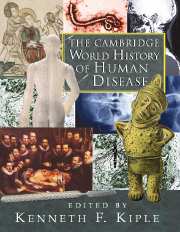Book contents
- Frontmatter
- Introduction
- Part I Medicine and Disease: An Overview
- Part II Changing Concepts of Health and Disease
- Part III Medical Specialties and Disease Prevention
- Part IV Measuring Health
- Part V The History of Human Disease in the World Outside Asia
- Part VI The History of Human Disease in Asia
- Part VII The Geography of Human Disease
- VII.1 Disease Ecologies of Sub-Saharan Africa
- VII.2 Disease Ecologies of the Middle East and North Africa
- VII.3 Disease Ecologies of South Asia
- VII.4 Disease Ecologies of East Asia
- VII.5 Disease Ecologies of Australia and Oceania
- VII.6 Disease Ecologies of the Caribbean
- VII.7 Disease Ecologies of Europe
- VII.8 Disease Ecologies of North America
- VII.9 Disease Ecologies of South America
- Part VIII Major Human Diseases Past and Present
- Indexes
- References
VII.6 - Disease Ecologies of the Caribbean
from Part VII - The Geography of Human Disease
Published online by Cambridge University Press: 28 March 2008
- Frontmatter
- Introduction
- Part I Medicine and Disease: An Overview
- Part II Changing Concepts of Health and Disease
- Part III Medical Specialties and Disease Prevention
- Part IV Measuring Health
- Part V The History of Human Disease in the World Outside Asia
- Part VI The History of Human Disease in Asia
- Part VII The Geography of Human Disease
- VII.1 Disease Ecologies of Sub-Saharan Africa
- VII.2 Disease Ecologies of the Middle East and North Africa
- VII.3 Disease Ecologies of South Asia
- VII.4 Disease Ecologies of East Asia
- VII.5 Disease Ecologies of Australia and Oceania
- VII.6 Disease Ecologies of the Caribbean
- VII.7 Disease Ecologies of Europe
- VII.8 Disease Ecologies of North America
- VII.9 Disease Ecologies of South America
- Part VIII Major Human Diseases Past and Present
- Indexes
- References
Summary
The Pre-Columbian Period
The belief that the American Indians were indigenous persisted until relatively recently. But today it is generally accepted that the first Americans were actually wandering Asians who took advantage of the prevailing ice age to cross the Bering Straits from Siberia to Alaska and enter a continent devoid of human life. Then, perhaps 10,000 years ago most of the large ice caps melted and seas rose, inundating the land bridge and sealing off the Asian pioneers in what would later be called the New World.
They were hunter-gatherers, these pioneers, with a nomadic way of life, which meant that when a band became too numerous to function efficiently, a part would break off and move on to new lands. Gradually this hiving out took them southward, and archeological remains tentatively suggest that some 9,000 years ago the southerly thrust finally came to an end as they reached the southern tip of South America.
It seems to have been much later, however, that the first humans settled the islands of the Caribbean, although there is neither a firm date nor agreement on the mainland from which those first to arrive came. For example, the northern Antilles, Cuba, is a short sailing distance from both southern Florida and the Yucatan Peninsula, whereas on the other end of the island chain, to the southeast, lies Trinidad, just off the South American continent.
When the first Spaniards reached the Caribbean, they found at least four Indian cultures whose bearers had apparently arrived at different times, with the levels of those cultures reflecting the stage of human development on the mainlands when the mingrations occurred.
- Type
- Chapter
- Information
- The Cambridge World History of Human Disease , pp. 497 - 504Publisher: Cambridge University PressPrint publication year: 1993
References
- 2
- Cited by



